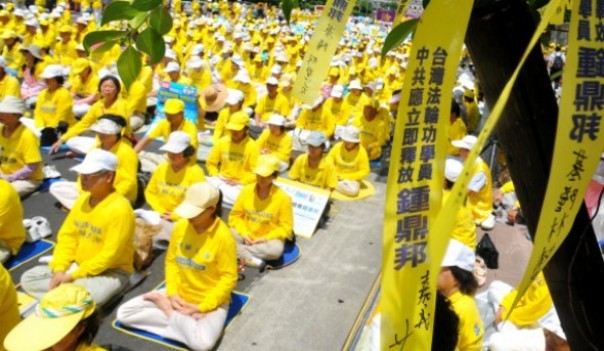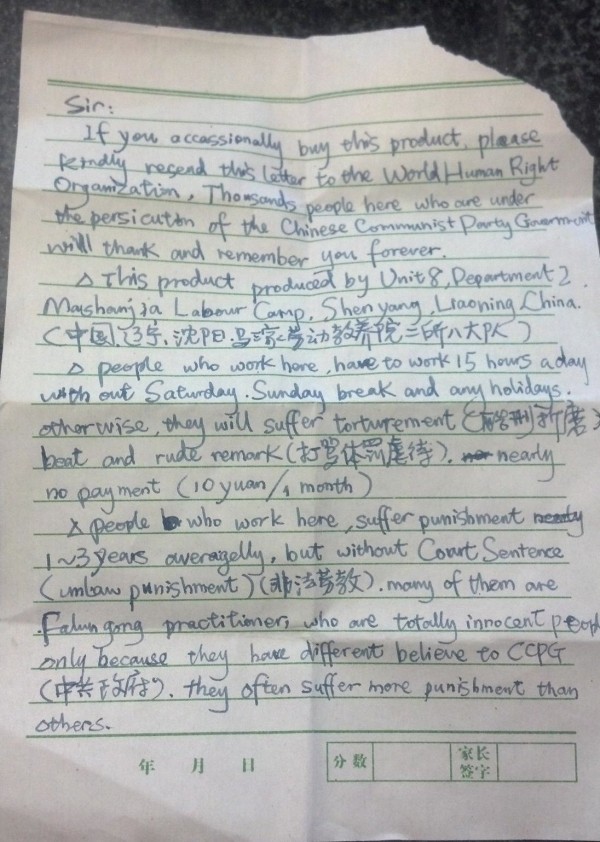
China Detainee Letter In Halloween Decorations Prompts Falun Gong Activists To Speak Up
By Jessica Elgot, January 2, 2013
The Huffington Post UK
It was a story of horror which emerged out of a box of decorations, opened by an Oregon mother and later going viral online over the Christmas period.
It was a plea for help, found in a K-Mart box of styrofoam tombstones, which described appalling conditions in one of China’s detention camps, where members of the Falun Gong religion have been imprisoned.
Many sceptics raised eyebrows at the letter’s well-crafted English and doubts over whether a prisoner could sneak out such a letter. [Note from FOFG editor: English is commonly taught in China as a second language, and numerous refugees who had been imprisoned in forced-labour camps in China have reported that they made products to be sold in the West while they were imprisoned.]

But genuine or not, Falun Gong activists told The Huffington Post UK that they hope it will draw attention to some of the conditions in Chinese labour camps and the persecution of members of their religion, which stems from the spiritual teachings of Li Hongzhi, and was founded in 1992.
The Chinese Communist Party views Falun Gong as a “destructive cult”, with Xinhua state news agency calling it “opposed to the Communist Party of China and the central government, preaches idealism, theism and feudal superstition.”
Falun Gong members in London currently hold a 24-hour, seven day a week vigil outside the Chinese Embassy. One of the participants, Yong Li, 56, was imprisoned in Masanjia in 2001, the same camp described in the letter found in the box of decorations.
Speaking through a translator, Yong, who comes from Liaoning province in northern east China, told The Huffington Post UK: “I am so grateful to the person who would write this letter, people inside that camp feel so helpless, they feel like no-one knows what is going on inside, no-one knows about their plight.
“But it was very dangerous for them to write, if they are found they could be tortured or even killed.
She is convinced of the authenticity of the letter. “It is something I know I would have wanted to do. But I did not speak English, it would have been too much of a risk.”

Yong told The Huffington Post UK that she went to Beijing in the winter of 2000, and was first arrested after holding up a banner promoting Falun Gong in Tiananmen Square.
Before she was transferred to Masanjia, she was detained in another five places, where she went on hunger strike and had to be forced fed during the seven months she was imprisoned.
Prisoners had tasks which included “making artificial paper flowers, toys, plastic dolls and doing farm work like manual transplanting rice seedling; and we were working hours about 13 to 14 hours a day; there was no pay and extreme bad working conditions; no sleep if the allocated work was not finished.
“There were around 1,000 prisoners at the time and majority of them were Falun Gong practitioners in Masanjia.
“It looks very civilized from outside, nice decoration and gardening near the entrance, but the internal operation was not human at all”.
Another Falun Gong activist, who asked to be identified as ‘Betty’ told The Huffington Post she had been shocked after seeing Yong after her imprisonment: “She looked very distressed and physically weak when I first met her about five or six years ago. Now she looks like a normal Chinese lady at her age.”
Betty’s parents were also imprisoned for their Falun Gong beliefs, although they have now been freed and are living in the UK. “My mother was forced to do labor work when she woke up in early morning and till late evening in the detention centre.
“She was forced to peel garlic skin for local food production company. She did not get paid at all. Instead, she was paying money to the detention centre so that she could buy an instant noodle pot, or toilet tissue paper, the daily essentials.
“They ate, slept, worked, went to the toilet, and washed, if lucky enough to have water, in a same small room, with many other women. No wonder things produced in China are competitively priced, because some of the companies do not have to pay salary.”
She also believes the authenticity of the letter. “Yes, the letter looks genuine for me. The characters are right and the paper is a sheet from a homework book for primary school student.
“I fully believe that the writer of the letter, no matter if she or he practise Falun Gong or not, is full of courage. It is amazing that they can write a letter, especially in good English, in that very tightly controlled environment.
“It must have taken him or her sometime to write it and also took effort to make sure it was packed in the box. And they must also know that s/he would be targeted once the letter is published outside China.
“It is not difficult to match the handwriting because they gave very accurate information of the location of the production.
“But I would think she or he must have prepared themselves for the consequence if it is the only way to awaken the people who do not know the truth, such as the lady who bought the Halloween decoration.”
____________
Related Story: Halloween decorations carry haunting message of forced labor
